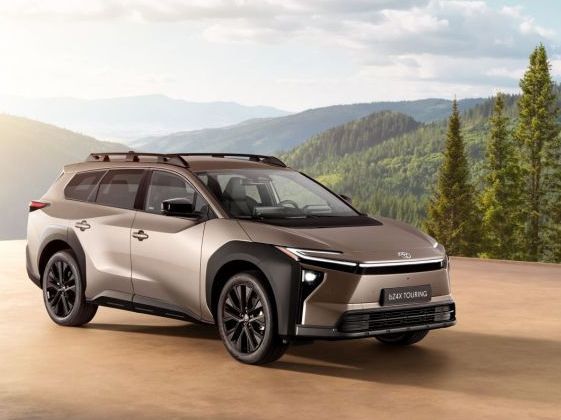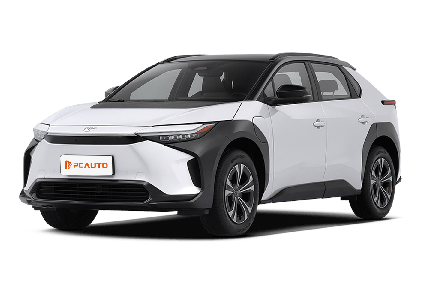Q
What is the range of the Toyota bZ4X 2022?
Toyota's first all-electric SUV, the 2022 bZ4X, hits Malaysian shores with range figures that vary by driveline. The front-wheel-drive variant clocks in at around 500 km on the WLTC cycle, while the all-wheel-drive model, with its dual-motor setup guzzling a smidge more juice, manages roughly 460 km. That puts it right in the ballpark for what you'd expect from other EVs in its class.
Under the floor, there's a 71.4kWh battery pack, and it supports fast charging up to 150kW. That means you can top it up from 10% to 80% in about 30 minutes – handy for those longer road trips Malaysians love. Now, it's worth keeping in mind that real-world range can take a hit depending on how you drive, if you're cranking the AC, or the terrain you're tackling – think frequent stop-starts or hilly roads, and you might see those km numbers dip a bit.
Toyota's backing the bZ4X with an 8-year/160,000 km battery warranty, which should give owners some peace of mind for the long haul. Looking at the competition, rivals like the Hyundai IONIQ 5 or Volkswagen ID.4 also offer endurance in the 450-550 km window. So, when it comes down to choosing, shoppers will probably weigh up things like charging convenience, interior space, and the after-sales service network.
The good news is the Malaysian government is pushing hard to expand the charging infrastructure, so hitting the road in an EV for those longer journeys should get a whole lot easier in the years to come.
Special Disclaimer: This content is published by users and does not represent the views or position of PCauto.
Popular Cars
Model Year
Car Compare
Car Photo
Latest Q&A
Q
Do spark plugs degrade over time?
Spark plugs do age gradually over time, and their performance degradation is mainly influenced by a combination of material, engine operating conditions, and usage environment. As a basic type, nickel alloy spark plugs are recommended to be inspected and replaced every 20,000 kilometers. Platinum and iridium spark plugs, due to their excellent corrosion resistance, can last 50,000 to 80,000 kilometers, while ruthenium spark plugs can even reach 150,000 kilometers. Turbocharged engines, due to their high-temperature and high-pressure environment, accelerate electrode wear, requiring the replacement interval to be shortened to about 60% of that for ordinary models. If the vehicle experiences difficulty starting in cold conditions, lacks acceleration power, or shows abnormally increased fuel consumption, it may be caused by enlarged electrode gaps or carbon deposits on the spark plug insulators, necessitating immediate inspection and repair. It is worth noting that even if the mileage threshold is not reached, spark plugs will exhibit decreased ignition efficiency due to metal oxidation after three years of installation. It is recommended to dynamically adjust the maintenance plan based on the service manual and actual vehicle conditions. Regularly using a specialized gap gauge to check the electrode gap (typically 0.7-1.1mm) and avoiding low-quality fuel can effectively extend spark plug service life.
Q
Will my car run better with new spark plugs?
Replacing spark plugs can indeed make a vehicle run more smoothly and improve overall performance. New spark plugs ensure more complete ignition, increasing fuel combustion efficiency, thereby enhancing power output and reducing fuel consumption—typically saving about 5% to 10% of fuel. Worn spark plugs can cause difficulty in starting, reduced power, and increased exhaust emissions, while new ones improve cold-start performance, reduce engine vibration, protect the three-way catalytic converter, and extend engine life.
It is recommended to determine the replacement interval based on the material: ordinary nickel alloy spark plugs should be replaced every 20,000 kilometers, platinum spark plugs approximately every 40,000 kilometers, and iridium spark plugs can last 60,000 to 80,000 kilometers. Specific intervals should be referenced from the vehicle manual. Additionally, matching the OEM heat range specification is crucial: high-compression-ratio engines require cold-type spark plugs (high heat range), while low-compression-ratio engines are suitable for hot-type spark plugs (low heat range). Incorrect selection may lead to knocking or carbon buildup.
When replacing spark plugs yourself, ensure the spark plug holes are cleaned to prevent debris from entering the cylinders, and tighten them to the specified torque—over-tightening may damage the cylinder head threads. If the vehicle exhibits symptoms like sluggish acceleration, rough idling, or abnormally high fuel consumption, the spark plug condition should be inspected promptly.
Q
What are the signs of bad spark plugs?
Spark plug malfunctions can affect vehicle performance through various obvious symptoms, mainly manifesting as difficulty starting (multiple attempts required for both hot and cold starts), abnormal engine vibration at idle and during driving, a noticeable reduction in power output, an abnormal increase in fuel consumption, and unexplained stalling while driving. The core causes of these issues include electrode carbon deposits leading to short-circuit and spark failure, improper spark plug gaps (too small limits spark intensity, too large results in insufficient voltage), insulator cracks causing leakage, or electrode detachment due to long-term electrical erosion. When the insulation resistance value of the spark plug decreases, the ignition voltage will be weakened or even completely fail. In addition, short-circuiting of high-voltage lines or erosion of platinum contacts may also cause single-cylinder or multi-cylinder misfires. It is recommended to replace spark plugs regularly every 40,000 to 60,000 kilometers, but the specific interval should refer to the vehicle manual, as material differences (such as nickel alloy for 20,000 kilometers, iridium for 60,000-80,000 kilometers) will also affect their lifespan. If excessive exhaust emissions (such as black smoke) or acceleration hesitation are detected, the spark plug condition should be checked immediately to avoid derivative problems such as three-way catalytic converter damage caused by prolonged malfunctions. During replacement, ensure debris is cleaned from the installation holes and high-voltage lines are correctly connected according to the ignition sequence to maintain cylinder balance.
Q
Can spark plugs affect gas mileage?
Spark plugs do have a significant impact on fuel economy, and their performance status is directly related to the combustion efficiency of the engine. When the spark plug electrodes are worn or carbon-fouled due to long-term use, the ignition energy will weaken, leading to incomplete combustion of the air-fuel mixture. At this point, the ECU will compensate for the power loss by increasing the fuel injection volume, and fuel consumption may rise by 15% to 20%. The spark plug gap is also a key factor; the standard gap is typically 0.8-1.1 millimeters. A gap that is too large will result in insufficient ignition voltage, while a gap that is too small will impede flame kernel propagation. Both scenarios will reduce thermal efficiency. The replacement intervals for spark plugs made of different materials vary significantly: nickel alloy spark plugs are recommended to be replaced every 30,000 kilometers, platinum ones can last up to 60,000 kilometers, and iridium spark plugs can maintain performance for 80,000-100,000 kilometers due to their higher melting point. It is worth noting that heat range matching is equally important. If a cold-type spark plug with excessive heat dissipation is used, it is prone to carbon buildup under low-temperature conditions; conversely, hot-type spark plugs may cause pre-ignition in high-temperature environments. It is recommended that vehicle owners adhere to the manufacturer's maintenance schedule and select premium spark plugs that meet the heat range specifications and carry MS 828 certification. This approach not only optimizes fuel efficiency but also extends the oxygen sensor's lifespan, achieving overall fuel cost savings of approximately 5%-8%.
Q
How do I know if my spark plugs need replacing?
To determine whether spark plugs need replacement, the following signs and criteria can be used: When a vehicle experiences difficulty starting, rough idling, weak acceleration, or an abnormal increase in fuel consumption, it may be due to aging spark plugs causing reduced ignition efficiency. During disassembly and inspection, the electrode condition should be observed; if the tip shows severe erosion, carbon buildup, or the electrode gap exceeds 0.8mm (the standard value for ordinary nickel alloy spark plugs), immediate replacement is required. Spark plugs of different materials have significantly different lifespans: nickel alloy spark plugs are recommended to be replaced every 20,000 kilometers, while platinum and iridium spark plugs can last 40,000 kilometers and 60,000-80,000 kilometers respectively. It is worth noting that prolonged short-distance driving or frequent start-stop cycles will accelerate spark plug wear, and in such cases, replacement should be performed 20% earlier than the recommended mileage. When selecting replacement parts, the original equipment manufacturer's heat range specifications must be strictly matched. Common brands such as NGK or Bosch provide vehicle-specific cross-reference tables in their product catalogs; incorrect heat ranges can lead to engine knocking or carbon buildup issues. During installation, a torque wrench should be used to tighten to the specification of 15-20N·m; over-tightening may damage the cylinder head threads, resulting in repair costs as high as 300-500 Malaysian Ringgit.
View MoreRelated News

The redesigned Toyota bZ4X returns to Malaysia:Minor tweaks won't break the stalemate, long behind the competitive market.
LienJan 13, 2026

2026 Toyota bZ4X features a larger battery and longer range but needs to be sold at a lower price
WilliamDec 12, 2025

Zeekr 7X VS Toyota bZ4X: Which car, from China or Japan, is more futuristic?
Kevin WongOct 15, 2025

Toyota's Most Powerful EV: Coming to Europe First in 2026
JamesJun 9, 2025

Toyota bZ4X Receives a Major Update in North America, Showing the Benefits Learned from Chinese EVs
JohnMay 15, 2025
View More








Pros
Cons